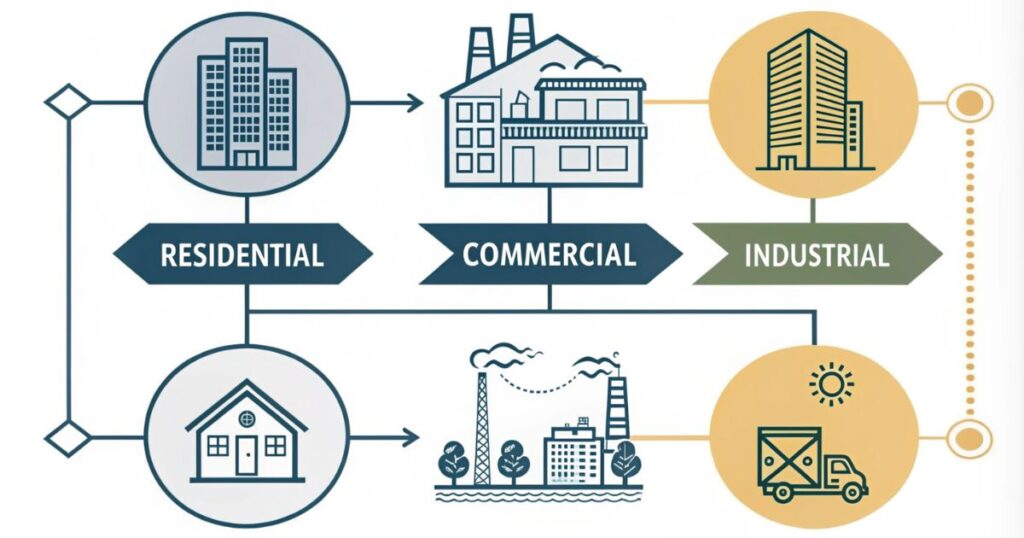Real estate investment is a journey full of opportunities, whether you’re a seasoned investor or just starting to explore your options. Have you ever wondered what makes real estate such a powerful asset class? From building wealth over time to diversifying your portfolio, understanding the types of real estate investments is key to making informed decisions and unlocking long-term financial success.
In this blog, we’ll delve into the diverse world of real estate—from residential and commercial properties to innovative options like REITs and crowdfunding platforms. Along the way, you’ll discover the benefits, challenges, and potential each investment type offers. So, whether you’re looking to expand your knowledge or take your first step into this exciting field, this guide has everything you need to get started. Ready to dive in? Let’s explore the possibilities together!
Key Takeaways
- Real estate offers diverse investment opportunities, from residential and commercial properties to REITs and crowdfunding platforms.
- Rental properties provide steady cash flow and long-term wealth-building potential, while flipping offers quick profits for risk-tolerant investors.
- Special-purpose real estate, such as healthcare facilities and recreational properties, caters to niche markets with unique challenges and rewards.
- International real estate investments allow portfolio diversification and access to emerging markets but require understanding legal and cultural differences.
- A well-defined investment strategy, whether buy-and-hold, flipping, or short-term rentals, is essential for achieving financial goals in real estate.
- Staying informed, starting small, and building a strong network are crucial for long-term success in the real estate market.
Residential Real Estate Investments: Your Gateway to Building Wealth

When it comes to real estate, residential properties often serve as the foundation for many investors. Why? Because they are familiar, in high demand, and offer a variety of options to match different investment strategies. If you’ve ever considered dipping your toes into real estate, chances are residential investments were your first thought.
Why Residential Real Estate?
Residential properties cater to the most basic human need—shelter. This makes them not only a secure investment but also a versatile one. Whether you’re looking to generate passive income or build long-term wealth, residential properties can align with your goals.
Types of Residential Real Estate Investments
- Single-Family Homes
These are ideal for first-time investors due to their simplicity. Single-family homes are easier to manage and attract a broad range of tenants, making them a popular choice for rental income. - Multi-Family Properties
Think duplexes, triplexes, or apartment complexes. These properties are perfect for those seeking higher cash flow, as multiple rental units mean more income potential. However, they often require more management and upfront investment. - Vacation Rentals
With platforms like Airbnb, vacation rentals have surged in popularity. These properties provide short-term income but can demand more effort in marketing and maintenance. - Condominiums and Co-Ops
These are appealing for investors seeking low-maintenance options. While they come with HOA fees, their locations in urban centers often make them high-demand rentals.
Benefits of Residential Real Estate Investments
- Steady Income Stream: Rental properties can provide consistent cash flow, especially in areas with high demand.
- Appreciation Potential: Over time, residential properties often increase in value, offering significant returns upon resale.
- Tax Advantages: From mortgage interest deductions to depreciation, residential real estate offers multiple tax benefits.
Is Residential Real Estate Right for You?
If you enjoy working with tenants, have a knack for property management, or are drawn to tangible assets, residential real estate might be your ideal starting point. Plus, it allows you to diversify your portfolio without venturing into complex investments.
Ready to explore more opportunities in real estate? Stay tuned for the next section, where we’ll dive into commercial real estate investments and uncover how they can elevate your portfolio.
Commercial Real Estate Investments: Unlocking Opportunities Beyond Residential Properties

Have you ever driven past a bustling office building or a busy retail space and wondered who owns it? Commercial real estate opens doors to high-income potential, diverse opportunities, and the chance to participate in shaping thriving communities. Whether you’re looking to diversify your investments or take a step toward larger-scale properties, commercial real estate offers exciting possibilities.
What is Commercial Real Estate?
At its core, commercial real estate includes properties used for business purposes. These spaces generate income for their owners through leasing or renting to businesses, making them a lucrative investment choice.
Types of Commercial Real Estate Investments
- Office Buildings
From sleek skyscrapers to suburban office parks, these properties cater to businesses seeking workspace. They often come with long-term leases, ensuring steady income but requiring a keen understanding of market trends. - Retail Spaces
Shopping malls, standalone stores, and strip malls fall into this category. Retail spaces can generate significant cash flow but may fluctuate with changing consumer habits and economic cycles. - Warehouses and Industrial Properties
With the rise of e-commerce, warehouses have become a hot commodity. These properties, including logistics hubs and distribution centers, offer stable demand and lower tenant turnover. - Mixed-Use Developments
These innovative properties blend residential, commercial, and sometimes even industrial spaces into one location. Think of urban centers where people can live, work, and shop—all in one place.
Why Invest in Commercial Real Estate?
- Higher Income Potential: Commercial properties typically offer higher rental yields compared to residential real estate.
- Diversification: They allow you to spread your risk across different types of businesses and industries.
- Professional Relationships: Commercial leases often involve corporations or businesses, creating a professional and structured relationship.
Challenges to Consider
Commercial real estate, while rewarding, comes with its complexities:
- Market Knowledge: Success requires an understanding of market trends and tenant needs.
- Higher Costs: Upfront costs and maintenance can be significantly higher than residential properties.
- Vacancy Risks: Longer vacancy periods can occur, particularly during economic downturns.
Is Commercial Real Estate Right for You?
If you’re ready to embrace larger-scale investments, understand business operations, and enjoy navigating market dynamics, commercial real estate could be your next big move. With proper research and a clear strategy, these properties can add significant value to your investment portfolio.
Curious about other types of real estate investments? In the next section, we’ll explore industrial real estate and how it’s shaping the future of logistics and commerce. Stay tuned!
Industrial Real Estate Investments: The Backbone of Modern Commerce

Have you ever thought about where all those online orders get processed or how goods are stored and shipped to your doorstep? Industrial real estate might not have the glamour of residential or commercial properties, but it plays a crucial role in the global economy. For savvy investors, this sector offers unique opportunities to capitalize on the growing demand for logistics and infrastructure.
What is Industrial Real Estate?
Industrial real estate includes properties designed for manufacturing, storage, distribution, and other industrial purposes. With the e-commerce boom and the increasing need for streamlined supply chains, industrial spaces have become a high-demand asset.
Types of Industrial Real Estate Investments
- Manufacturing Plants
These facilities are used for producing goods, often customized for specific industries. While they offer long-term leases, the initial investment can be significant due to specialized infrastructure requirements. - Logistics and Distribution Centers
Think of massive warehouses used by giants like Amazon. These properties are essential for storing and distributing goods quickly, making them a hot commodity in today’s fast-paced marketplace. - Flex Spaces
These versatile properties combine office space with light industrial areas. They’re perfect for businesses that need a blend of workspace and storage, offering flexibility for tenants and consistent demand for landlords. - Specialized Industrial Facilities
From cold storage for perishable goods to data centers for tech companies, these niche investments cater to specific needs. While they require expertise, they can deliver high returns due to their specialized nature.
Benefits of Industrial Real Estate Investments
- Steady Demand: With global trade and e-commerce on the rise, industrial properties are in constant need.
- Low Maintenance: Compared to residential properties, industrial spaces often require less frequent maintenance.
- Long-Term Leases: Tenants typically sign longer leases, providing stability and predictable income.
Challenges to Consider
Industrial real estate isn’t without its hurdles:
- High Initial Costs: The infrastructure for industrial properties can require a significant upfront investment.
- Zoning and Regulations: Navigating local zoning laws and compliance requirements can be complex.
- Economic Sensitivity: Industrial demand can fluctuate with economic cycles and shifts in trade patterns.
Is Industrial Real Estate the Right Fit for You?
If you’re intrigued by the logistics and infrastructure driving global commerce, industrial real estate might be your perfect match. It’s an excellent choice for investors seeking stability, long-term leases, and the opportunity to tap into niche markets.
Looking to explore even more unique real estate investments? In the next section, we’ll dive into land investments and uncover how raw and developed land can be lucrative assets in your portfolio. Don’t miss it!
Land Investments: Unlocking the Potential Beneath Your Feet

Have you ever thought about investing in land? While it may seem like a simple, passive choice, land investments offer a wealth of possibilities. Whether it’s undeveloped raw land or plots primed for development, this often-overlooked real estate asset can be a powerful addition to your investment portfolio. But is it the right choice for you? Let’s dig in.
What is Land Investment?
Land investment involves purchasing a piece of land with the intent to develop, lease, or hold for future resale. Unlike other real estate types, land has no structures or tenants to manage, making it a unique and flexible option.
Types of Land Investments
- Raw Land
This is land in its natural state, untouched by development. Investors often buy raw land with the hope that future demand will increase its value. While it requires patience, the payoff can be significant. - Residential Development Land
Perfect for developers, this type of land is zoned for housing projects like single-family homes or apartment complexes. As cities expand, residential land becomes a hot commodity. - Commercial Development Land
Think shopping centers, office buildings, or mixed-use spaces. Commercial land is ideal for investors looking to collaborate with businesses and developers to create high-traffic properties. - Agricultural Land
Whether it’s farmland, vineyards, or pastures, agricultural land appeals to those looking for steady income from farming or leasing. It’s also a hedge against inflation as food production remains a global necessity.
Benefits of Land Investments
- Low Maintenance: Unlike properties with tenants, land doesn’t require constant upkeep, saving you time and money.
- Appreciation Over Time: Land often increases in value as nearby areas develop, providing long-term growth potential.
- Flexibility: You can develop, lease, or simply hold land depending on market conditions and your financial goals.
Challenges of Land Investments
Investing in land isn’t without its complexities:
- Zoning Restrictions: Understanding zoning laws is crucial as they determine how you can use the land.
- Lack of Immediate Income: Unlike rental properties, land investments don’t typically generate income until developed or sold.
- Market Volatility: Land value can fluctuate based on location, demand, and economic conditions.
How to Maximize Your Land Investment
To make the most of your land investment:
- Research areas with high growth potential, such as expanding cities or regions with planned infrastructure projects.
- Work with local authorities to understand zoning regulations and future development plans.
- Consider partnering with developers or leasing the land to generate passive income.
Is Land Investment Right for You?
If you’re looking for a low-maintenance investment with long-term growth potential, land could be the perfect fit. It’s especially appealing for those willing to play the long game or who have a clear vision for development.
Eager to discover more real estate opportunities? In the next section, we’ll explore special-purpose real estate investments and how they cater to unique niches with high returns. Stay with us!
Special-Purpose Real Estate: Niche Investments with Unique Potential

Have you ever come across a hospital, school, or sports arena and wondered about its ownership? Special-purpose real estate is a fascinating niche within the real estate world. These properties are designed for specific uses, offering investors opportunities to diversify their portfolios while supporting essential community needs. But what makes these investments stand out, and are they right for you?
What is Special-Purpose Real Estate?
Special-purpose real estate refers to properties built for unique, often singular uses. Unlike residential or commercial properties, these investments cater to specific industries or community functions, making them a distinctive option for experienced investors seeking diversification.
Types of Special-Purpose Real Estate
- Healthcare Facilities
Think hospitals, clinics, and long-term care facilities. These properties cater to a growing demand for healthcare services, especially in aging populations. Leases are often long-term, providing consistent income. - Recreational Properties
Examples include golf courses, amusement parks, and sports arenas. While these properties can generate significant revenue, their success depends heavily on location and management. - Educational Buildings
Schools, colleges, and training centers fall into this category. These properties are often leased to governments or private educational institutions, offering stable and reliable returns. - Religious Institutions
Churches, mosques, and synagogues are examples of community-driven real estate. While they may not provide high returns, they often come with strong tenant stability.
Benefits of Special-Purpose Real Estate
- Diverse Income Streams: These properties cater to niche markets, ensuring less competition and more stable demand.
- Long-Term Leases: Tenants often sign lengthy leases due to the property’s specialized nature.
- Community Impact: Investing in special-purpose real estate often supports critical services, creating a positive social impact.
Challenges to Consider
Despite their potential, these investments require careful planning:
- Limited Marketability: Reselling a highly specialized property can be challenging due to its unique use.
- High Initial Costs: Custom-built facilities often require significant upfront investment.
- Management Complexity: Recreational properties or healthcare facilities, for instance, may require active involvement or partnership with experienced operators.
Tips for Investing in Special-Purpose Real Estate
- Conduct thorough research to understand the industry or community needs the property serves.
- Partner with experts, such as healthcare or education consultants, to assess feasibility and demand.
- Diversify within this category by exploring different types of special-purpose properties to reduce risks.
Is Special-Purpose Real Estate for You?
If you’re an experienced investor seeking diversification or passionate about making a community impact, special-purpose real estate could be an excellent fit. These investments combine profitability with purpose, offering a unique way to grow your portfolio.
Looking for more inspiration? In the next section, we’ll explore real estate investment trusts (REITs) and how they make real estate accessible to everyday investors. Stay tuned!
Real Estate Investment Trusts (REITs): Making Real Estate Accessible to Everyone

Have you ever wanted to invest in real estate but felt deterred by the high costs or complexities of property ownership? Real estate investment trusts, or REITs, are a game-changer for individuals looking to enter the real estate market without buying physical properties. Whether you’re a seasoned investor or just starting, REITs offer an accessible and flexible way to grow your portfolio.
What Are Real Estate Investment Trusts?
REITs are companies that own, operate, or finance income-generating real estate. By purchasing shares in a REIT, you gain access to a diversified portfolio of properties, from office buildings to shopping centers, without the need to manage or maintain them.
Types of REITs
- Equity REITs
These REITs own and manage properties, generating revenue through rental income. They are the most common type and cater to a range of assets like residential, commercial, and industrial real estate. - Mortgage REITs (mREITs)
Instead of owning properties, mREITs focus on financing real estate by investing in mortgages and mortgage-backed securities. They make money through the interest earned on these investments. - Hybrid REITs
As the name suggests, hybrid REITs combine the features of equity and mortgage REITs, offering a balanced approach to real estate investing. - Publicly Traded vs. Private REITs
Publicly traded REITs are listed on stock exchanges and can be bought or sold like stocks, offering high liquidity. Private REITs, on the other hand, are not traded on exchanges and may require higher minimum investments but often offer greater exclusivity.
Why Invest in REITs?
- Diversification: REITs allow you to invest in various real estate sectors, reducing the risks tied to a single asset.
- Passive Income: With REITs required by law to distribute at least 90% of their taxable income as dividends, they provide a steady income stream.
- Liquidity: Unlike traditional real estate, publicly traded REITs are easy to buy and sell, offering flexibility to investors.
- Accessibility: REITs make real estate investing affordable, often requiring minimal capital compared to buying properties outright.
Challenges to Keep in Mind
- Market Volatility: Publicly traded REITs can be influenced by stock market fluctuations.
- Tax Implications: Dividends from REITs are taxed as ordinary income, which can impact your overall returns.
- Interest Rate Sensitivity: REITs can be affected by rising interest rates, which may increase their borrowing costs and reduce profitability.
How to Start Investing in REITs
- Research REIT Options
Look for REITs aligned with your goals—whether that’s steady income, long-term growth, or exposure to specific sectors like healthcare or retail. - Evaluate Performance
Review metrics such as dividend yield, growth history, and the management team’s track record. - Choose an Investment Platform
You can invest in REITs through brokerage accounts, mutual funds, or ETFs.
Is Investing in REITs Right for You?
If you’re looking for an affordable, hands-off way to diversify your investments and generate passive income, REITs could be an excellent choice. They provide an opportunity to benefit from real estate’s potential without the responsibilities of property ownership.
Next up, we’ll explore real estate crowdfunding and syndication, two innovative approaches that are revolutionizing how people invest in real estate. Stay with us!
Real Estate Crowdfunding and Syndication: A Modern Way to Invest

Have you ever dreamed of owning a share of a luxury hotel, a sprawling apartment complex, or a bustling office building? Real estate crowdfunding and syndication have revolutionized the way people invest, making it possible for individuals to pool their resources and access lucrative opportunities that were once reserved for high-net-worth investors. But how does it work, and is it the right choice for you?
What is Real Estate Crowdfunding?
Real estate crowdfunding involves pooling funds from multiple investors to finance a real estate project. This is typically facilitated through online platforms, which connect investors with vetted developers or property managers. Crowdfunding allows you to invest in properties with a fraction of the capital traditionally required.
What is Syndication?
Syndication is a collaborative investment model where a group of investors teams up to purchase a larger property, often led by a syndicator or sponsor. The sponsor manages the property and investment, while the investors provide the capital and earn a share of the profits.
How Crowdfunding and Syndication Work
- Access to Opportunities
Both models open doors to high-value properties like multi-family apartments, commercial spaces, or even international real estate. - Investment Amounts
Crowdfunding platforms typically require lower minimum investments, making them accessible to beginners. Syndication, on the other hand, often involves higher buy-ins but offers more control and potentially greater returns. - Profit Distribution
Investors earn returns through rental income, property appreciation, or a combination of both. In syndication, profits are split based on each investor’s contribution, while crowdfunding returns vary by platform and project.
Benefits of Crowdfunding and Syndication
- Accessibility: These models make real estate investing achievable for individuals with smaller budgets.
- Portfolio Diversification: Invest in various property types and locations without the need for full ownership.
- Hands-Off Approach: Professional management means you can reap the rewards without handling day-to-day operations.
- Scalability: Start small and scale your investments as you grow more confident.
Challenges to Consider
- Platform and Sponsor Risks: Not all platforms or syndicators are created equal. Research is essential to avoid scams or underperforming investments.
- Illiquidity: Unlike REITs or publicly traded assets, crowdfunding and syndication investments are less liquid, often requiring a long-term commitment.
- Shared Control: With multiple investors involved, decisions are often made collectively, limiting individual influence.
Tips for Success in Crowdfunding and Syndication
- Choose Reputable Platforms: Look for platforms with transparent practices, strong reviews, and a proven track record.
- Understand the Terms: Always read the fine print, including fees, expected returns, and lock-in periods.
- Diversify Your Investments: Spread your investments across different projects to minimize risk.
Is Real Estate Crowdfunding or Syndication Right for You?
If you’re seeking an affordable way to enter the real estate market or diversify your existing portfolio, these models can be a great fit. They offer the potential for significant returns without the responsibilities of property ownership, making them ideal for hands-off investors.
Looking for even more real estate strategies? Up next, we’ll compare rental properties and flipping to help you decide which approach aligns best with your financial goals. Keep reading!
Rental Properties vs. Flipping: Which Real Estate Strategy Fits Your Goals?

When diving into real estate investing, one of the most common dilemmas is deciding between rental properties and flipping. Both strategies have their own set of benefits, challenges, and financial rewards. So, how do you know which path is right for you? Let’s break it down and explore the unique advantages of each approach.
What are Rental Properties?
Rental properties are long-term investments where you purchase a property to lease it out to tenants. This strategy provides a steady income stream while allowing your property to appreciate over time.
Benefits of Rental Properties
- Consistent Cash Flow: With rental income, you can enjoy a reliable monthly revenue stream.
- Long-Term Wealth Building: As your property value appreciates, you gain equity that can significantly enhance your net worth.
- Tax Advantages: Rental properties offer various tax benefits, including deductions for mortgage interest, maintenance, and depreciation.
Challenges of Rental Properties
- Tenant Management: Dealing with tenants can be time-consuming, especially if unexpected issues arise.
- Ongoing Maintenance: Properties require regular upkeep, which can cut into your profits if not managed effectively.
- Market Dependence: Rental demand can fluctuate based on location and economic conditions.
What is Flipping?
Flipping involves purchasing a property, renovating it, and selling it for a profit within a short time frame. This strategy is ideal for investors who prefer quick returns over long-term commitments.
Benefits of Flipping
- Quick Profits: A well-executed flip can deliver substantial returns in a matter of months.
- Creative Outlet: Flipping allows you to unleash your creativity through design and renovations.
- No Long-Term Commitment: Once the property is sold, you’re free to move on to the next project.
Challenges of Flipping
- High Upfront Costs: Renovations and holding costs can add up quickly, requiring careful budgeting.
- Market Timing: Success depends heavily on market conditions, as property values can shift unexpectedly.
- Risk of Loss: If renovation costs exceed expectations or the property sits unsold, profits can dwindle.
How to Choose the Right Strategy for You
To decide between rental properties and flipping, consider the following factors:
- Your Financial Goals
- Are you seeking steady, long-term income? Rental properties may be the way to go.
- Do you prefer short-term projects with higher potential rewards? Flipping might suit you better.
- Your Risk Tolerance
- Rentals offer more stability but may require ongoing management.
- Flipping carries higher risks but can deliver faster results.
- Your Time Commitment
- Rentals require long-term involvement, especially if you manage the property yourself.
- Flipping is more intensive in the short term but allows you to move on quickly.
A Hybrid Approach: The Best of Both Worlds
Can’t decide? Some investors opt for a hybrid strategy. For instance, you can flip properties to generate quick capital and reinvest those profits into rental properties for long-term growth. This approach balances risk and rewards, giving you the flexibility to adapt to market conditions.
So, Which Strategy is Best for You?
Ultimately, the right choice depends on your goals, resources, and lifestyle. Rental properties are perfect for building steady, long-term wealth, while flipping appeals to those who thrive on fast-paced, creative projects. Whichever path you choose, success lies in thorough research, strategic planning, and staying adaptable to market trends.
Still exploring your options? In the next section, we’ll discuss international real estate investments and how they open doors to global opportunities. Don’t miss it!
International Real Estate Investments: Expanding Your Horizons

Have you ever dreamed of owning a beachfront villa in the Caribbean or a modern apartment in a bustling European city? International real estate investments offer a unique way to diversify your portfolio while exploring exciting opportunities across the globe. But is investing overseas as glamorous as it sounds? Let’s uncover the potential—and the challenges—of going global.
What Are International Real Estate Investments?
International real estate investments involve purchasing property outside your home country. These properties can range from residential homes and vacation rentals to commercial spaces and even raw land. They allow you to tap into emerging markets, benefit from favorable economic conditions, and access unique lifestyle opportunities.
Why Consider International Real Estate?
- Diversification
Investing in international markets spreads your risk and reduces dependency on the economic conditions of a single country. - High Growth Potential
Emerging markets often offer properties at lower prices with the potential for significant appreciation. - Currency Benefits
Favorable exchange rates can make foreign investments more affordable and boost your returns when repatriating income. - Lifestyle Perks
Owning property abroad could mean a vacation home or even the option to retire in a dream destination.
Popular Types of International Real Estate
- Residential Properties
- Vacation Homes: Ideal for personal use or short-term rentals in tourist hotspots.
- Long-Term Rentals: Generate steady income in cities with growing populations.
- Commercial Properties
- Retail spaces, offices, and warehouses in global business hubs can offer strong returns.
- These investments require a deeper understanding of local business dynamics.
- Agricultural Land
- Perfect for those looking to invest in food production or sustainable farming in regions with fertile soil.
Challenges of International Real Estate
While the rewards can be enticing, international real estate comes with its complexities:
- Legal and Tax Regulations: Each country has its own property laws and tax requirements, which can be daunting to navigate.
- Cultural Differences: Understanding local customs and market preferences is crucial for success.
- Currency Fluctuations: Exchange rate changes can impact your costs and returns.
- Property Management: Managing a property abroad often requires hiring local professionals, adding to expenses.
Tips for Successful International Investments
- Research Thoroughly
Learn about the local market, economic conditions, and legal requirements before making a move. - Work with Experts
Collaborate with local real estate agents, attorneys, and financial advisors to ensure compliance and maximize returns. - Start Small
Begin with a property in a familiar or stable market before expanding into riskier regions. - Plan for Expenses
Consider costs like property taxes, maintenance, and currency exchange fees when calculating potential returns.
Is International Real Estate Right for You?
If you’re seeking to diversify your portfolio, explore new markets, or even enjoy personal lifestyle benefits, international real estate can be a rewarding venture. However, success depends on doing your homework, building a trusted network, and staying informed about global trends.
In the next section, we’ll delve into real estate investment strategies, helping you choose the right approach for your goals and risk tolerance. Stay tuned to learn how to take your real estate investments to the next level!
Real Estate Investment Strategies: Crafting Your Path to Success

Navigating the world of real estate can feel overwhelming, especially with so many options and strategies to consider. Should you focus on long-term stability or aim for quick profits? The good news is that real estate investment strategies are as diverse as the properties themselves. With the right approach, you can tailor your investments to align with your financial goals, risk tolerance, and lifestyle preferences.
Why Have a Strategy?
A well-defined strategy acts as your roadmap, guiding you through decision-making and helping you stay focused on your goals. Without a plan, it’s easy to get lost in the complexities of the market.
Popular Real Estate Investment Strategies
- Buy-and-Hold Strategy
This classic approach involves purchasing a property and holding onto it for the long term, generating income through rent and capital appreciation.- Best for: Building wealth over time with minimal selling.
- Key Benefits: Steady cash flow, tax advantages, and equity growth.
- Flipping for Profit
If you enjoy fast-paced projects and creative transformations, flipping might be your style. This strategy focuses on buying undervalued properties, renovating them, and selling them quickly for a profit.- Best for: Investors seeking quick returns and higher risk.
- Key Challenges: Market timing and managing renovation costs.
- Short-Term Rentals (STRs)
Platforms like Airbnb have made short-term rentals a lucrative option. By renting out properties for short periods, you can maximize income from high-demand tourist locations.- Best for: Investors in prime vacation or urban areas.
- Key Considerations: High management demands and seasonal fluctuations.
- BRRRR Method (Buy, Rehab, Rent, Refinance, Repeat)
This strategy is perfect for those looking to scale their portfolio systematically. By reinvesting profits, you can grow your investments over time.- Best for: Ambitious investors aiming for exponential growth.
- Key Steps: Find distressed properties, improve them, and leverage their value for refinancing.
- Passive Investments
If you prefer a hands-off approach, consider REITs, crowdfunding platforms, or partnering with syndicators. These options allow you to invest in real estate without the hassle of property management.- Best for: Busy professionals or those new to investing.
- Key Advantage: Diversification and passive income potential.
Choosing the Right Strategy
To find the best fit, ask yourself:
- What are my financial goals?
Are you looking for steady cash flow, quick profits, or long-term growth? - How much time can I dedicate?
Hands-on strategies like flipping and STRs require more effort than passive investments. - What’s my risk tolerance?
High-reward strategies like flipping often come with higher risks, while buy-and-hold approaches offer more stability.
Tips for Success
- Stay Educated
Keep learning about market trends, local regulations, and emerging opportunities. - Start Small
Begin with a manageable property or strategy to gain confidence and experience. - Build a Network
Surround yourself with trusted professionals, including real estate agents, contractors, and financial advisors. - Be Flexible
Real estate markets change, and adapting your strategy can help you stay ahead of the curve.
Is It Time to Define Your Strategy?
Choosing the right real estate investment strategy is all about aligning your approach with your unique goals and circumstances. Whether you’re building long-term wealth or seeking short-term gains, a clear plan will keep you on track.
In the final section, we’ll wrap up with actionable tips to tie together everything we’ve discussed and help you take the next step in your real estate journey. Let’s finish strong!
Conclusion
Investing in real estate is more than just a financial decision—it’s a gateway to building wealth, diversifying your portfolio, and creating opportunities that align with your goals. From the steady cash flow of rental properties to the high-reward ventures of flipping, the vast array of real estate investment types means there’s something for everyone, no matter your risk tolerance or experience level.
But as exciting as these opportunities are, the key to success lies in taking action. Ask yourself: Which investment type aligns with my financial goals? Am I ready to embrace the challenges and rewards of this dynamic industry? Your answers will help you carve out a path that’s uniquely yours.
Take the Next Step
- Start Small: Choose an investment strategy that matches your budget and expertise.
- Educate Yourself: Stay informed about market trends, emerging opportunities, and best practices.
- Build Your Network: Surround yourself with professionals who can guide and support your journey.
Remember, every seasoned investor started with a single step. Whether you’re exploring residential properties, diving into commercial real estate, or venturing into innovative models like crowdfunding and REITs, the opportunities are limitless. What matters most is that you start.
So, are you ready to turn your real estate dreams into reality? The road to success begins now. Take that first step, and you’ll be amazed at what you can achieve.
Happy investing!
FAQ
What are the different types of real estate investments?
Real estate investments include residential properties like single-family homes, commercial properties such as office buildings, industrial spaces like warehouses, and alternative options like REITs and crowdfunding.
How do rental properties generate income?
Rental properties provide income through tenant rent payments. They also offer long-term benefits like property appreciation and tax advantages, making them a popular investment choice.
What is flipping in real estate, and how does it work?
Flipping involves buying undervalued properties, renovating them, and selling them quickly for a profit. It requires market knowledge, renovation skills, and timing to succeed.
What are the advantages of investing in REITs?
REITs allow you to invest in real estate without owning physical property. They provide diversification, passive income through dividends, and easy liquidity as they are traded on stock exchanges.
What should you consider before investing in international real estate?
Factors include understanding local property laws, currency exchange rates, market demand, and cultural nuances. Collaborating with local experts is crucial for navigating international markets.
What is the difference between residential and commercial real estate investments?
Residential properties cater to individuals or families, while commercial properties are leased to businesses. Commercial investments often offer higher returns but come with greater risks and complexities.
How does crowdfunding work in real estate?
Crowdfunding pools funds from multiple investors to finance real estate projects. It provides access to high-value properties with smaller investments and is facilitated through online platforms.













